A conversation about anxiety
with Madina and Kelsey
My long time friend, inspiring Sydney based yoga teacher and creator of Emotional Release programs, Madina, recently sat down to talk anxiety with me. Here is what unfolded in our conversation.
Question 1:
Madina: Let’s talk anxiety. You shared with me once that this is an emotion that you used struggle with. I know your studies are quite deep and profound - what new things have you learnt in regards to dealing with anxiety?
Kelsey: Hi Madina, happy to be chatting with you!
In regards to my Masters degree in Psychotherapy and Counselling and just my own personal study and enquiry...my biggest take away is to drop into my body and make contact with my emotions. Be they anxiety or otherwise. Anxiety used to simmer always in the background for me through my teens and twenties. It wasn't until I learned to be mindful, present and more aware of my inner world that the grip it had on me lessened. This increased level of awareness mostly was developed through some amazing yoga classes in New York City at Yoga For The People on St. Marks place in the East Village. It's still open today! That studio will forever hold a special place in my heart and the classes I took when it first opened with the founder Greg.
My second early influence was Thich Nhat Han and his book Peace is Every Step. He writes about mindfulness meditation and has one practice where you repeat "Inhale, I am breathing in, Exhale, I am breathing out". I used to walk down the chaotic, noisy streets of the East Village repeating this mantra to myself. So simple and so powerful. It was the start of a new path for me as I learned that through inner awareness and presence, I could feel okay.
Photo by Deniz Altindas on Unsplash
Question 2:
Madina: How do you think we get stuck in feeling anxious? What causes us to get in that loop?
Kelsey:
Anxiety is interesting, again, like any emotion, because it can be different for different people. For me, the underlying causes were a sense of lacking and not okayness. A feeling that I wasn't enough and had to continually prove myself to others and receive their approval to feel okay. Again, through inner work, a lot of therapy sessions (a wonderful requirement of the study I'm doing!), I increased my self confidence and thus felt more okay and less anxious. There is no quick fix though, I think to overcome these loops, takes a lot of time, patience and outside help.
Anxiety also feeds on itself. It's a nervous system on high alert. Our NS is activated through a real or imagined threat and then we become hyper vigilant. This is a normal and often very useful process that has kept humans alive for many centuries. It only becomes a problem when we have trouble shutting it off and relaxing, returning to feeling safe again. (Assuming you're lucky enough to live somewhere where there is a place of safety for you). Circling back, here is where the mindfulness, breathing and yoga come in because they can help us realise that we are okay, safe and don't have to continue to be on high alert even if it's just for a few moments. That few moments eventually becomes hours, days, weeks...
It's also important for me to mention trauma here and acknowledge that some of us may have suffered from one or numerous traumatic incidents in our lives that can drastically effect how the nervous system operates. In those cases, it may be more than just some breathing that is needed, therapy and medication can be useful to bringing someone out of high alert so the underlying work can be done.
That all said, as humans, its very unrealistic to think we will never be stressed or anxious. Again, those emotions are a normal part of life, its just how we learn to manage them and our life that is important. Less about trying to make them go away totally and be calm all the time. I don't know anyone who is calm all the time! How boring that would be. :-)
Question 3:
Madina: What is the opposite to anxiety and how do you cultivate that feeling?
Kelsey: I spoke a little about this above, so just expanding here. I think there are a few ways to see the opposite emotion because I don't think anything has a direct and exact opposite per say. As anxiety is a fear about the future and a worry about what may go wrong or bad things that may happen, one way of thinking about the opposite of that is presence. To be in the moment and in the now. Another, more obvious "opposite", is calm or peace or serenity. Another would be the feeling, as I mentioned earlier, of okayness.
Cultivating those feelings is really about finding inner resilience. It's all well and good to work towards calm and peace but we're going to get stressed sometimes too, so how do we handle it when it does come up is a really useful line of enquiry I believe.
As part of my Masters program, I've recently been studying Gestalt Therapy, a specific counselling modality. There is this beautiful theory called the Paradoxical Theory of Change. It says that "change occurs when we become what we are, not when we try to become what we are not" - Arnold Beisser (1970). I'd like to close with that idea, encourage people reading to accept themselves fully, in each moment, no matter how uncomfortable that moment may be. That is when the real and long lasting change starts!!
Want to learn more?
Interested in personalised breathing practice just for you or working one to one together?




